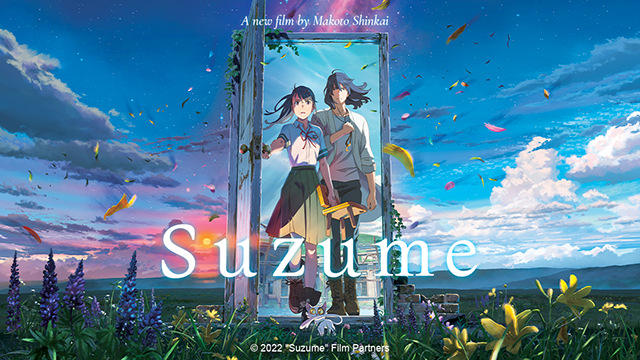Suzume: A Masterclass in Modern Anime Film
Love makes you irrational. You'll chase to the ends of the Earth to be with those you love. And maybe, you'll even defy the natural order to do so. Makoto Shinkai does it again with Suzume, his most recent film that had its Western release on April 14, 2023. Shinkai has been the anime director to watch since his hit 2016 film Your Name, which took audiences by storm. Quickly that film gained appeal for its beautiful visuals and profound romantic story. Suzume is the culmination of all his work and he has perfected his two-act formula for these romantic-fantasy films.

Suzume follows the story of an ordinary high school girl, Suzume, who gets wrapped up in a secret battle between Godly forces under Japan that has been causing the frequent and deadly earthquakes that the nation has often suffered from. She meets Souta, a Closer, whose job is to close gateways that allow these forces to ravage the Earth, who is surprised to learn she can see these forces when most humans cannot. We are taken on a long, dangerous, and insightful journey when Suzume accidentally releases one of these forces and Souta is cursed as a result.
Like many of Shinkai's films, we are not really introduced to the characters and are thrust right into the action. We aren't informed of their motivations, their goals or their history; rather we get to know these characters as they get to know each other. What makes Shinkai's films so impactful is not just the beautiful visuals and fantastical story, but moreso giving us, the audience, the chance to fall in love too. We get to go on this journey with Suzume and Souta, and during the two hours of screen time, we are slowly falling in love with them just as they are with each other. Their tenacity, desperation, and sheer will are nothing to scoff at, and when the story ends, we are left wanting more. This is the Shinkai effect.
Shinkai's signature pacing makes his films feel like a two-act play, having two clear climaxes in all his works. This is a departure from regular film direction, and is a testament towards Shinkai as an auteur. Now, this isn't to say Shinkai's films are all the same. This film was distinctly more humorous, and many times in the theater I found myself laughing out loud. These small changes, as well as the unique fantasy aspects of each of his works, allows for the films to follow his formula, while also being their own products.
Now, there is clear Hayao Miyazaki influence; he is the director and founder of the Studio Ghibli, namely known for Spirited Away (2001), Howl's Moving Castle (2004), My Neighbor Totoro (1988) and Princess Mononoke (1997). Miyazaki is known well for telling profound, spiritual, impactful stories using Japan's history and lore as a framework. Suzume seems to draw from elements of this, but does so in a way where romance is at the center of the story, opposed to Miyazaki's emphasized adventure. As a long time Miyazaki fan, seeing his influence even now is always exciting, especially when done in a way that honors him, rather than trying to imitate him. The biggest difference is the art style and music.
Shinkai collaborates again with artist Kenichi Tsuchiya for his striking and vibrant art style. No detail is too small, and every scene is full of saturated colors and subtle movements. 2D animation usually gets away with still shots, little detail and big gestures, such as just moving the eyes or mouths or doing a wide angle to rid of unnecessary detail. But modern anime films tend to continue Miyazaki's legacy of making sure every small movement and mannerism is displayed. This, along with Shinkai's creative camera angles, allows Suzume the charm that live action possesses, while also being able to lean into the fantasy aspect without much dissonance. The use of CGI is almost undetectable, and is done superbly to mimic the 2D animation. I could watch a hundred films in this style and never fully be able to appreciate the intricacies.
The music by Kazuma Jinnouchi is incredibly effective at evoking the emotions our main character feels. When the signs of an imminent disaster are apparent to Suzume, we already know due to the heavy bass and feeling of dread that comes along with it. The music puts us in Suzume's shoes, and we feel like the ordinary girl who got swept into this amazing, important, scary mess. The musics lulls us into an ease, and just as quickly shakes us awake when things go bad. That is effective score-writing.
Suzume is an experience you go on, not just a movie you watch. Animation tends to get shafted to the wayside: considered "just a kids film," but often times, there is a lot more to offer. Some of my favorite films are animated, and Shinkai's films are examples that demand to be paid attention to. Fall in love, feel scared, lean into the profound and unknown. But if you can't handle open-ended films, maybe these aren't for you. All I can say is you won't know until you try.

0 Comments Add a Comment?